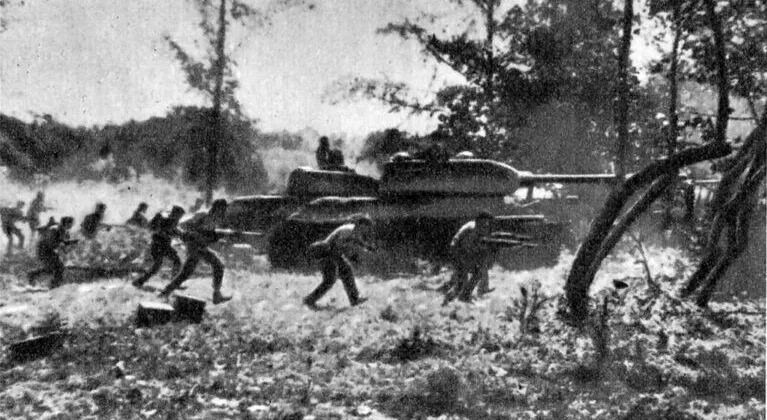
Counter-attack by Cuban Revolutionary Armed Forces supported by T-34 tanks near Playa Giron during the Bay of Pigs invasion, 19 April 1961. Photograph Source: Rumlin – CC BY 3.0

Orinoco Tribune – News and opinion pieces about Venezuela and beyond
From Venezuela and made by Venezuelan Chavistas

Counter-attack by Cuban Revolutionary Armed Forces supported by T-34 tanks near Playa Giron during the Bay of Pigs invasion, 19 April 1961. Photograph Source: Rumlin – CC BY 3.0
By Melvin Goodman – Oct 20, 2025
The United States must not adopt the tactics of the enemy. Each time we do so, each time the means we use are wrong, our inner strength, the strength that makes us free, is lessened.
– Senator Frank Church, 1976
The CIA has committed every crime there is except rape.
– General Walter Bedell Smith, former Director of Central Intelligence, 1949
The term “covert action” is a peculiarly American invention; it does not appear in the lexicon of other intelligence services. Nor does the term appear in the National Security Act of 1947, which created the Central Intelligence Agency. Covert action refers to secret operations to influence governments, organizations, or persons in support of a foreign policy in a manner that is not attributable to the United States.
Donald Trump has gone a step further than all other presidents by ignoring plausible denial; he announced the “secret” authorization to allow the CIA to conduct covert action in Venezuela against President Nicolas Maduro. This represents the latest attempt to apply pressure on Venezuela. It follows authorization for the U.S. military to target boats that may or may not be carrying drugs. Thus far, five boats have been destroyed and 29 Venezuelans (and some Colombians) have been killed. Venezuela is a target even though it plays no role in the fentanyl trade, and accounts for little of the cocaine that enters the United States.
Trump’s use of the military has been even more threatening. It involves the deployment of F-35 fighter planes and 10,000 troops in Puerto Rico, eight combatant ships, and an attack submarine. More recently, elite Special Operations aviation has flown near the Venezuelan coast, and helicopters and even B-52 strategic bombers have been sighted. Trump and Secretary of State Marco Rubio are presumably hoping that U.S. military pressure will lead the Venezuelan military to overthrow its president.
In the wake of this buildup, the head of the U.S. Southern Command, Admiral Alvin Holsey, has announced his retirement, an apparent protest of this dangerous activity. Holsey has privately complained that he wasn’t even consulted about some of the provocative actions that Trump, Rubio, and CIA director John Ratcliffe have engineered. It is highly unusual for a combatant commander to leave his post early.
U.S. covert action, which began under the Eisenhower administration, has been marked by incredible and often predictable failure. The worst failures were in Iran (1953), Guatemala (1954), the Congo 1959, and Chile (1973), where leftist leaders were overthrown only to be followed by the accession to power of authoritarians and tyrants such as the Shah, Julio Alpirez, Mobutu, and Pinochet, respectively. These authoritarians introduced brutal regimes and repressive military forces, many of whom received military training from the CIA. When U.S. ambassadors in Central America protested this activity, they were ordered to stop reporting on such criminal activity, and some were forced out of the Foreign Service.
Trump Orders CIA To Attack Venezuela: US Military Kills Innocent People in War Based on Lies
The CIA also trained and supported abusive internal security organizations throughout Central America, particularly in Nicaragua, Honduras, and El Salvador. In Honduras, death squads grew out of collaboration between the CIA and the Honduran military. The CIA was closely involved in the formation and training of the notorious Battalion 316, and CIA operatives had exclusive access to their secret detention centers.
Revelations of assassination plots in Cuba, the Congo, the Dominican Republic, and Vietnam in the early 1960s—at the direction of Presidents Eisenhower and Kennedy—finally led to a ban on CIA political assassinations in the mid-1970s. In 1984, however, the CIA displayed its contempt for the ban on assassination when it produced a manual for the Contras that discussed “neutralizing” officials in Nicaragua.
The nadir of the CIA’s covert action was the Bay of Pigs invasion of Cuba in 1961, when U.S. and CIA ignorance of Fidel Castro’s popularity led the CIA to launch an ill-fated paramilitary operation. Several Cubans, initially trained by the CIA for covert action, were involved in the break-in of the Democratic National Committee’s office in the Watergate complex ten years later.
Despite the failures of clandestine activity and covert action, the CIA has received increased funding annually from a bipartisan congress. The failure to address the problems associated with covert action has been compounded by the failure to address the problem of oversight. Oversight needs to be strengthened and operational failures must be studied. The Trump presidency ensures that laws will be ignored, congress will not be consulted, the Pentagon and the CIA will have free rein, and President Truman’s original conception of the CIA as an objective interpreter of foreign events will be breached.
Melvin A. Goodman is a senior fellow at the Center for International Policy and a professor of government at Johns Hopkins University. A former CIA analyst, Goodman is the author of Failure of Intelligence: The Decline and Fall of the CIA and National Insecurity: The Cost of American Militarism. and A Whistleblower at the CIA. His most recent books are “American Carnage: The Wars of Donald Trump” (Opus Publishing, 2019) and “Containing the National Security State” (Opus Publishing, 2021). Goodman is the national security columnist for counterpunch.org.